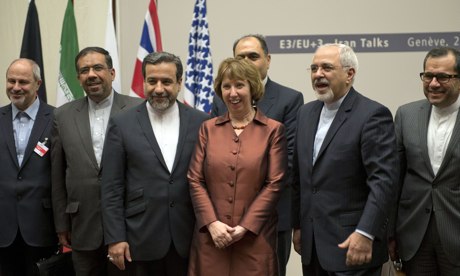
The four days of negotiations in Geneva have brought results. According to a foreign news agency report, Iran will restrict its nuclear activities for the next six months and not enrich uranium beyond 5 percent. In return, in the course of the next six months, the U.S. and other Western countries will provide $7 billion to help Iran’s economy recover and will not impose any new restrictions.
While giving a briefing at the White House, U.S. President Barack Obama said that this agreement was a step toward making the world secure. Iranian Foreign Minister Mohammad Javad Zarif has described the nuclear agreement as the key for solving issues, while maintaining that peaceful nuclear energy is Tehran’s right. An accord has been reached between Iran and six world powers, the positive effects of which will be seen in the days to come.
When Pakistan conducted atomic explosions 14 years ago, the whole of the Western world, including the European Union, raised a hue and cry about an Islamic bomb, and restrictions were imposed blindly on Pakistan. Pakistan’s nuclear program has always been a sore spot in America’s eyes. At times, the U.S. has raised fears about the program falling into the hands of terrorists; at other times, dirty tactics have been used to vilify Dr. A. Q. Khan. But now, six world powers have knelt before Iran, allowing it to enrich uranium, even though Iran has always challenged the U.S. at every step — including shooting down its drone — and has also announced that it has prepared missiles that can reach Israel.
What Imran Khan said about the U.S., that it first glowers, but then retreats if you stand your ground, has proved to be 100 percent accurate. The Iranian nation stood its ground in front of the U.S., so America retreated. The U.S. knew that if an understanding were not reached then Israel’s security would be endangered.
Now that U.S.-Iran relations have been straightened out, Pakistan should avail itself of this to control its energy crisis by completing work on the gas pipeline in a timely manner. Adviser Sartaj Aziz will be visiting Iran. Over there, he should also discuss the gas pipeline, so we may be able to control the energy crisis. Western countries will provide Iran with $7 billion over the course of the next six months for its economic recovery. Using this as a basis, we need to prepare investors for the pipeline.

Leave a Reply
You must be logged in to post a comment.